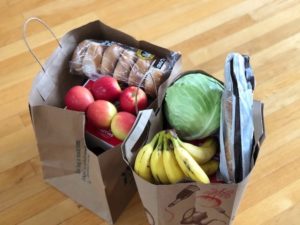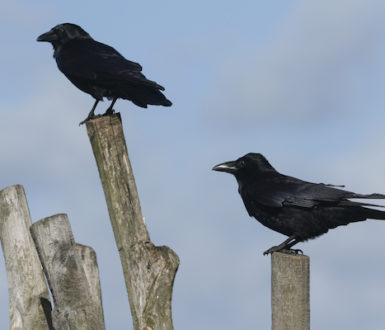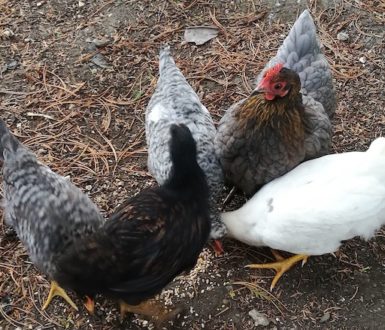
What can you see in this picture? Would you say it is some shopping? Or would you call it the messages?
Your answer depends on whether you speak English – or Scots, which is a related, yet subtly different language. Indeed, Scots is one of the 3 main languages in Scotland, with the other 2 being English and Scottish Gaelic (often seen on road signs, for example).
Scots is made up of dialects from across Scotland and the Scottish islands. You’ll hear it spoken regularly if you are ever in Scotland – but be aware that although it is similar to English, there are some different words*, and some words that are the same, but have different meanings.
One example concerns the exact vegetable that is meant by a ‘turnip’. For Scottish people, the turnip (or ‘tumshie’) is an orange root eaten with haggis and tatties (potatoes) as part of Scotland’s most famous meal. However, if online shopping from one of the English supermarkets in Scotland, it’s important to remember to order a ‘swede’, otherwise you’ll end up with what the English call a turnip. It’s also a root vegetable, just not the right one.
And it’s not just vegetables… here’s a short list that will ensure that you will know what to expect if you go out for the messages and then end up snacking on some ham pieces!
BALTIC
In English – relating to the Baltic sea
In Scots – freezing. For example: It wis Baltic in the station waiting room.
BURN
In English – to harm using fire or heat.
In Scots – a stream, for example: The boys went off tae the burn tae catch some fish.
CLOSE
In English – nearby
In Scots – a passageway leading to a tenement (type of apartment building). For example: The close was always needin’ a guid clean.
COO
In English – the noise a pigeon makes
In Scots – a cow. For example: It’s time they coos were milked!
COUPON
In English – a discount voucher
In Scots – a face. For example: His coupon wis needin’ a richt guid dicht wi’ a facecloth!
CRY
In English – to sob
In Scots – to name/call. For example: What do you cry the wumman in the butcher’s shop?
FLIT
In English – to move quickly
In Scots – to move house. For example: The McDonalds flitted tae a hoose in Ecclefechan last month.
GREETING
In English – a polite welcome.
In Scots – to cry. For example: The wee laddie was greeting’ for his mammy.
HOW
In English – to start an explanation
In Scots – the question why. For example: How is it that ye’re greetin’? (see above!)
HONKING
In English – the noise a goose makes.
In Scots – stinking. For example: It was honkin’ doon by the fish factory bins on a hot day.
MESSAGES
In English – short communications.
In Scots – your shopping. For example: I’m away tae the supermarket for the messages.
PATTER
In English – a light tapping sound
In Scots – to be good with words. For example: His patter meant he had nae bother meetin’ the lassies.
PIECE
In English – part of something
In Scots – a sandwich. For example: The laddie had some egg pieces for his dinner.
STEAMING
In English – emitting steam
In Scots – very drunk! For example: He staggered oot the pub as he was fair steamin’!
WINCH
In English – a mechanism using ropes that pulls or lifts
In Scots – to be romantically involved, for example: Dougal was winchin’ a lassie frae Dumfries.
∗It might help to have these Scots words explained too: bother = trouble; dicht = wipe; doon = down; fair = very; frae = from; guid = good; hoose = house; laddie = boy; lassie = girl; mammy = mother; nae = no; oot = out; richt = really; tae = to; wee = small; wi’ = with; wis = was; wumman = woman; ye’re = you are. You can see lots more on the Scots Language Centre website.
Image: Maria Lin Kim/Unsplash



